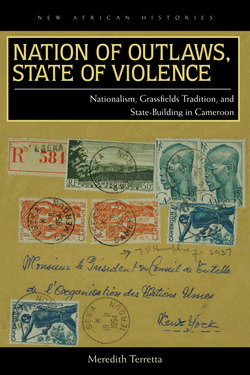Nation of Outlaws, State of Violence

Реклама. ООО «ЛитРес», ИНН: 7719571260.
Оглавление
Meredith Terretta. Nation of Outlaws, State of Violence
Отрывок из книги
Nation of Outlaws, State of Violence
SERIES EDITORS: JEAN ALLMAN AND ALLEN ISAACMAN
.....
In 1957, Ghana opened its borders to political activists deemed radical by their respective colonial administrations. Under the direction of Kwame Nkrumah and Pan-African cabinet members, including Ras T. Makonnen and George Padmore (who helped create the Bureau of African Affairs), Accra became the site of an African Affairs Centre, which from 1957 to 1966 hosted anticolonial activists and exiles from Egypt, Kenya, Uganda, Malawi, the Belgian Congo, Angola, Lesotho, Zambia, and Cameroon.65 For upécistes, this Pan-African political support proved essential and came not a moment too soon. Nkrumah declared his intent to fight for Africa’s liberation and in March 1957, just a few months after UPC party leaders had decided to organize an armed offensive within the territory and only three months before the party’s proscription in British territory, described anticolonial freedom fighters as “the gem of the revolution.” Facing arrest within their own territories, upécistes needed a place to go. To sustain the maquis within the Cameroon territories, they required funds, access to weapons, and military training. It was in Accra and Conakry that UPC directors found the diplomatic, financial, and military support necessary for the movement at the moment of its revolutionary turn.
In November 1958, Ahmed Sékou Touré of Guinea and Kwame Nkrumah of Ghana officially declared their two states to constitute “the nucleus of a Union of West African States” on which a United States of Africa would build. A month later, Nkrumah hosted the first All-African Peoples’ Conference (AAPC), in Accra. At the assembly of anticolonial political activists and intellectuals, which included Tom Mboya of Kenya, Holden Roberto of Angola, Patrice Lumumba of Congo, and UPC president Félix Moumié, Frantz Fanon declared that violence was the only path to economic, psychological, cultural, and political decolonization.66 His legitimization of revolutionary violence and the Pan-African foothold gave Moumié sufficient confidence to proclaim at a press conference on 12 December 1958, less than three months after FLN leaders announced the establishment of the Republic of Algeria’s provisional government (Gouvernement provisoire de la République algérienne—GPRA), that the party’s exiled directors’ bureau constituted the legitimate Cameroonian government.67
.....